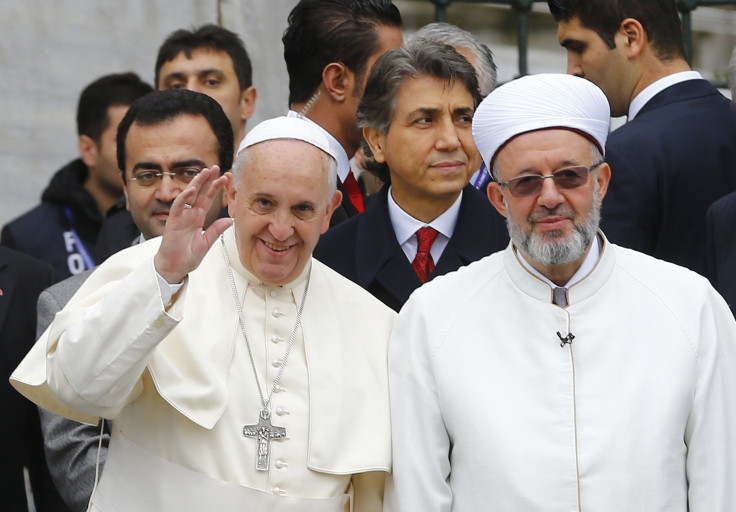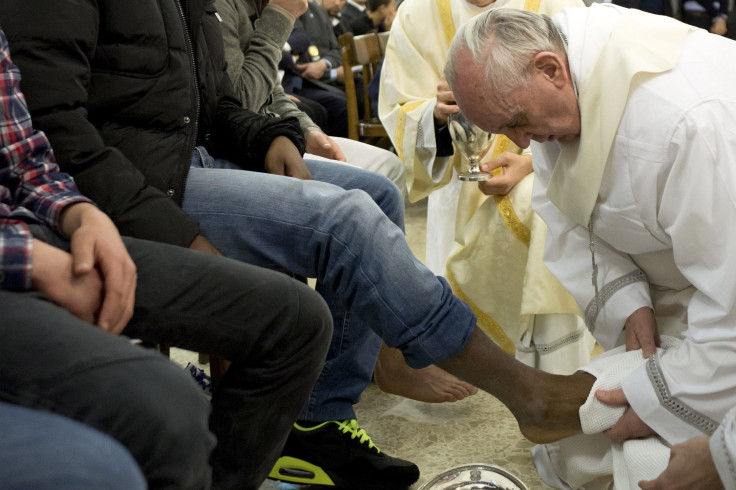Pope Francis US Tour: Muslim Leaders Prepare To Welcome 'Pope Of The People'

Imam Talib Abdur-Rashid, a longtime Muslim interfaith activist, said he admires Pope Francis for his eagerness to address human rights, environmental issues and “the sacredness of life.” Abdur-Rashid, who leads a largely African-American community, noted that the Argentinian pope has focused on issues that particularly affect the poor and are especially relevant to black Americans, including the elimination of capital punishment and an end to lifelong imprisonment. “He’s doing an excellent job of exemplifying a prophetic ideal of justice,” said Abdur-Rashid, who leads the Mosque of Islamic Brotherhood in Harlem, New York.
After years of tense relations and inflammatory rhetoric between Muslims and the Vatican that sparked protests across Muslim-majority countries, Pope Francis has sought to ease tensions, emphasized mutual values and shared beliefs, kissed a Quran and pushed for dialogue with Muslim communities since his election. His efforts have mended a deep wedge between the two communities, as Muslim faith leaders said the pope has come to embody religious values to which their communities also adhere. The growing relationship between the two faiths comes as Pope Francis for the first time tours the U.S. this week amid growing anti-Muslim sentiment from Republican and conservative leaders.
"For the last thousand years it’s been a very sour, bitter relationship," Sayyid Syeed, director of the Islamic Society of North America, said. The leader of the Indiana-based group was set to travel with the pope during his visit. "It was a pope that declared war against Muslims and Jews... the Crusades. And here you have at the beginning of a new millennium, a pope who is promoting understanding."
While interfaith dialogue between Muslims and Catholics within the U.S. has persisted for decades, many Muslims said Pope Benedict XVI did little to engage their community. Even after he quoted a 14th-century Christian emperor who described Islam as a source of violence at a lecture in Germany in September 2006, prompting outrage among many Muslims worldwide, Benedict took limited measures to make amends. The Vatican argued the pope was simply citing the statement, not endorsing it, yet when Francis was elected to the papacy, many Muslims were still disgruntled with the Vatican. But after learning of his pluralist vision and his intention to reach out to Muslim communities, there was a sigh of relief, Muslim leaders said.
Dozens of representatives from Muslim-American religious communities were invited to attend an interfaith meeting for peace Friday at the National September 11 Memorial & Museum in New York during Francis' visit, and a number leaders from Muslim and other religious communities were also expected to join the pope throughout his U.S. tour. Although past popes have also held interfaith sessions during their visits to the U.S., Francis was expected to lead a uniquely inclusive service, as leaders of other faith communities were expected to play active roles in the ceremony.

“I can say he has done much more than a lot of other great leaders,” said Tahir Kukaj, leader of the Albanian Islamic Cultural Center in Staten Island, New York, who was also invited to the interfaith meeting. “As a Muslim, and as an imam, I would say he moves from the spirit of truth. He’s calling for peace and justice, and he means what he says.”
The pope’s namesake, St. Francis of Assisi, might offer a hint into his vision. Assisi, a 13th century saint, famously crossed enemy lines to meet with the sultan of Egypt in order to bring an end to the Crusades. It has widely been considered a turning point in Muslim-Christian relations.
While bonds have undoubtedly improved since then, tensions between Christians and Muslims remain higher than ever in parts of the world, especially in regions of the Middle East. As Christians and other minorities have been targeted in Syria and Iraq by extremist groups claiming to fight in the name of Islam, the pope has emphasized that dialogue now is more important than ever.
Salam Al-Marayati, executive director of the Muslim Public Affairs Council, an American Muslim advocacy organization based in Los Angeles, said dialogue initiatives between Muslims and Catholics were some of the first interfaith programs in the U.S. While they have generally persisted regardless of the Vatican’s stance, he said the pope’s openness has refueled efforts in recent years.
“The Vatican definitely sets the tone and the pace, and makes it either easy or not as easy to have programming in the States,” he said. “I believe Pope Francis has created a new paradigm for Muslim-Christian relations. He’s done a wonderful job building a bridge -- not only in understanding but a bridge of cooperation.”
In one of his first papal speeches, Pope Francis announced plans to “intensify dialogue among the various religions” and specified the significance of dialogue with Muslims. Days later, he was photographed washing the feet of two Muslim Serbian female inmates at a prison in Rome. And months later, he extended a personal message to Muslims preparing to celebrate Ramadan. In the past, such greetings came indirectly through the Vatican’s office of interfaith dialogue.

In addition to the respect he’s earned for his stances on interfaith and a range of social and economic issues, the pope has been praised by many Muslims for his firm political stances on issues related to the Middle East -- issues that are significant for many Muslims. The Vatican officially recognized Palestine as a state in June. And in September, Pope Francis called on every parish to take in a family of Syrian refugees.
“Those are issues that Muslims have a concern for broadly, across the Muslim community, and again, these are human-rights-related issues," Abdur-Rashid said. "Most of the Muslims in America and in New York are immigrants, many of them are themselves refugees from oppressive situations... so I think those are further pluses on the side of the pope.”
© Copyright IBTimes 2024. All rights reserved.






















